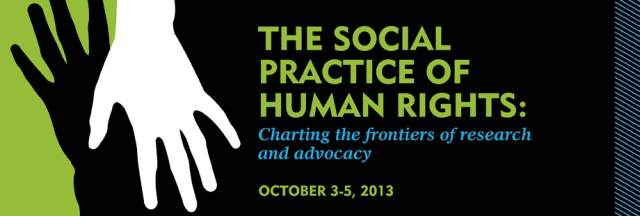Generic Testimonies in Human Rights Discourse
Location
River Campus - Room M2005
Start Date
10-4-2013 3:15 PM
Abstract
My essay begins by tracing the divide between the institutionalization of Holocaust studies in the US and the modern human rights movement back to their common point of germination in WWII. Against the crisis of the “end of testimony” in Holocaust studies, we see the rise of testimonial production taken up by human rights scholars. By comparing the production and reception of atrocity narratives across two distinct, post-WWII discourses, I argue that each sets formal limits on individual testimonies in order to regulate their function institutionally. In human rights discourse, for example, I show how atrocity testimonies are often used to establish the witness as a self-narrating subject of rights. Ultimately, each discourse directs not only which testimonies are read but how those accounts should be read. As a result, testimonies become generic. Within the discourse of human rights, I read across three ethnographic studies which look at separate categories of rights bearers—namely, refugees, immigrants, the indigenous, and survivors of sex slavery during war—to show how individual testimonies become generic when confronted by external expectations of the human rights community. In order to secure personal safety, individuals manipulate their testimony to fit the demands of their audience. I use examples such as the emergence of professional storytellers who coach refugee women to present generic accounts of rape in order to strengthen their pleas for asylum. I also reference personal interviews with Tibetan refugee communities in northern India and Austria, and NGOs operating with favela communities in Brazil. Ultimately, I contend that human rights discourse itself acts as a genre, where genre is defined in the words of Tzvetan Todorov as providing “horizons of expectation for readers and models of writing for authors.”
Generic Testimonies in Human Rights Discourse
River Campus - Room M2005
My essay begins by tracing the divide between the institutionalization of Holocaust studies in the US and the modern human rights movement back to their common point of germination in WWII. Against the crisis of the “end of testimony” in Holocaust studies, we see the rise of testimonial production taken up by human rights scholars. By comparing the production and reception of atrocity narratives across two distinct, post-WWII discourses, I argue that each sets formal limits on individual testimonies in order to regulate their function institutionally. In human rights discourse, for example, I show how atrocity testimonies are often used to establish the witness as a self-narrating subject of rights. Ultimately, each discourse directs not only which testimonies are read but how those accounts should be read. As a result, testimonies become generic. Within the discourse of human rights, I read across three ethnographic studies which look at separate categories of rights bearers—namely, refugees, immigrants, the indigenous, and survivors of sex slavery during war—to show how individual testimonies become generic when confronted by external expectations of the human rights community. In order to secure personal safety, individuals manipulate their testimony to fit the demands of their audience. I use examples such as the emergence of professional storytellers who coach refugee women to present generic accounts of rape in order to strengthen their pleas for asylum. I also reference personal interviews with Tibetan refugee communities in northern India and Austria, and NGOs operating with favela communities in Brazil. Ultimately, I contend that human rights discourse itself acts as a genre, where genre is defined in the words of Tzvetan Todorov as providing “horizons of expectation for readers and models of writing for authors.”




Comments
This biennial conference provides a unique space for scholars, practitioners and advocates to engage in collaboration, dialogue and critical analysis of human rights advocacy — locally and globally. Learn more about the Human Rights Center at the University of Dayton >>>.